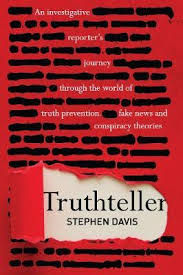Truthteller by Stephen Davis
- NZ Booklovers

- Jun 28, 2019
- 2 min read

There is a war on truth – and the liars are winning. So says author Stephen Davis, an award-winning journalist and leading journalism educator.
His book Truthteller draws on his three decades of journalism experience to examine some of the many stories he has worked on over the years. Within the book is a call to action that urges readers to become more critical consumers of the media. To do that, he argues, we must be able to recognise the ways people try to deceive or hide things from us.
Using his stories as case studies, Davis highlights the “tools of truth suppression” used by people to manipulate the story.
He breaks down each tool, relating it to his stories, offering a critical insight into the world of journalism and public relations. He exposes shocking details of deception on stories he has worked on across the world, including Aotearoa.
From revealing why New Zealand citizens were deliberately flown into a war zone, and how a Kiwi soldier was scapegoated because he tried to tell the truth, Davis is fair-handed and reflective. He examines both source and the journalist, looking at the ways too that the media manipulate the truth.
Davis digs deep into the world of the media – examining bots and trolls, the ethical standards of Twitter, the short attention spans of readers and the move to online ‘clickbait’, and the rush to meet consumer’s insatiable appetite for news. Conspiracy theories, ‘fake news’ and hashtags all get the once over by Davis.
He argues too that we have been slow to defend and explain the value of journalism, and too quick to abandon the traditional skills of reporting, “lured in by the siren song of social media”.
Davis backs up his critiques with real-life situations. Some of the examples were stories I knew nothing about, which led me to having to do some background reading. However, there are plenty of examples that come from New Zealand’s recent history – including the breakdown of Team New Zealand, and a recent rescue in Antarctica.
While reading, his urgent message to the reader to become more critical sinks in, and you will find yourself questioning the author himself. There were times where more information or proof of his claims would have been nice to have on the page.
However, his website offers additional links and video clips relating to each chapter.
Davis writes easily and succinctly, which makes what could have been a very heavy topic a relatively easy and engaging read. He offers readers an insight into the world of an investigative reporter, through his own battles, and the personal and professional costs and lives damaged along the way.
As he argues, “we will be the losers, unless we start to pay more attention”. He asks readers to teach our children about how to be intelligent consumers of information. To learn, once again, the difference between fact and opinion and to be mindful about what information we share in this connected online world.
It is an important message. Davis’s book is an essential guide and support on how we can begin to understand the modern media world.
Reviewer: Rebekah Fraser
Exisle Publishing, RRP $29.99



